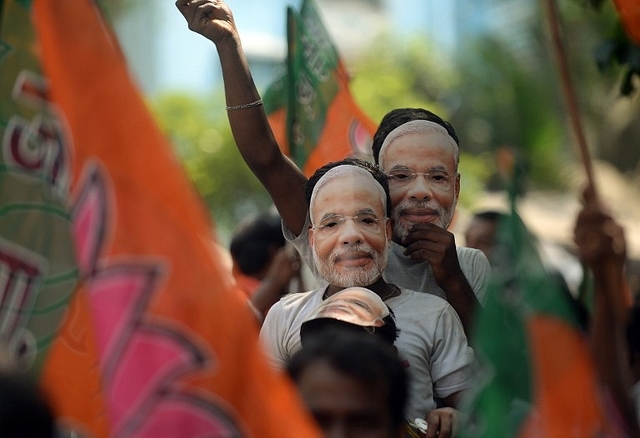
Is India’s Destiny Caste in Stone?
The Maharashtra elections are a litmus test for Modi’s brand of aspirational politics
Former USA Secretary of State Madeleine Albright famously said that citizens talk to their governments in the language of the 21st century; governments listen to their citizens using tools of the 20th century and come up with 19th century responses. The general election of 2014 was a Black Swan event in the history of our democracy that demolished several preconceived perceptions about India’s polity including the notion that caste is the governing principle of Indian elections.
As the Modi wave changed the political landscape of the country, his rivals were left fighting for political survival. And in their desperation, they fell back upon the oldest trick in the book- reservations. After its disastrous performance in the Lok Sabha elections where the ruling Congress-NCP combine won just 6 out of 48 seats in Maharashtra, they feared the worst in the state Assembly elections due in October. Accordingly, they rushed through a proposal to provide 16 per cent reservation for Marathas and 5 per cent for Muslim communities in jobs and educational institutions of Maharashtra.
There are major objections against compensatory reservation in general and Maharashtra government’s policy in particular. These objections rest on both legal and moral grounds. A series of PILs were filed against the Maharashtra government’s July order in the Bombay High Court and the court has reserved its order on the matter.
The Congress-NCP government implemented this additional quota with a complete disregard for constitutional norms and values. With the additional 21 per cent quota for Marathas and Muslims, the total reservation in Maharashtra now stands at 73 per cent. This is substantially higher than the 50 per cent ceiling on all reservations set by the Supreme Court in the Indira Sawhney case. Further, there is an explicit bar on religion-based reservation in our Constitution and only certain sections of the Muslim population which are classified as OBCs are entitled to such benefits. The 5 per cent blanket reservation for the entire Muslim community flies in the face of this restriction. Finally, several studies, including a report by the National Commission on Backward Classes, have concluded that Marathas are not “socially or educationally backward” and therefore should not be accorded benefits of reservation.
But there is also a moral argument against compensatory discrimination. Andre Beteille, described as the “wisest man in India” by historian Ramchandra Guha, wrote in his book Democracy and Its Institutions that all democracies function on a delicate balance between two competing principles: rule of law and rule of numbers. Our democracy has swerved in the populist direction at the cost of constitutional morality by creating conflicts between various social groups competing for reservations.
Caste-based quotas are always a zero-sum game in which new castes can be accommodated only at the expense of people who are already deriving the benefits of reservation under status quo, thereby splintering our society into the haves and have-nots whose interests are irreconcilable.
The Mandal agitation in the early 1990s, the Youth for Equality movement in 2006 and most recently the 2008 Gujjar unrest demanding ST status like the Meenas are glaring examples of how compensatory reservation destroys our delicate social fabric. There are fears that the reservation for Marathas may spark a violent reaction from the Jhangar (shepherd) community.
It gets worse: once a category is promised benefits on ascribed identity, politics and power will congeal around it. This creates a system of perverse incentives in which every community competes to become backward. And our politicians are more than willing to acquiesce to these demands because of the first-past-the-post system that we follow which reduces elections to a numbers game. If you can divide a community and appeal to one part if it’s big enough, and if they all vote for you, that’s all you need to win the election.
Identity politics thus reduces the social contract between the citizen and state to a commercial contract between a politician and his electorate in which votes are traded for quotas and patronage to the chosen castes. It’s not a coincidence that a financial metaphor is used to describe the beneficiaries: “vote-banks”.
I like to believe that the 2014 General Elections was a watershed moment in India’s polity because aspirational politics won over identity politics. The coming Assembly elections in Maharashtra will be a litmus test for aspirational politics. The people of India spoke in the language of the 21st century during the General Elections and the government of Maharashtra has now come out with a 19th century response.
If the BJP, with or without support from other parties, manages to form the government despite the incumbent government’s move to give reservations to the dominant Marathas and the Muslims, we can safely say that “India’s destiny is not caste in stone”.